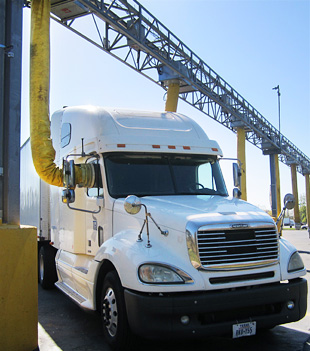Jan. 8, 2021
Saving Fuel in the Garden State with Truck Stop Electrification
Truck stop electrification plays an important role in reducing unnecessary idling, fuel consumption, and tailpipe emissions.
New Jersey Clean Cities Coalition
Long-haul truck drivers throughout the United States typically idle their vehicles during mandated rest periods to maintain access to air conditioning, heat, and electricity. But truck stop electrification (TSE) sites across the country allow truckers to use these auxiliary systems without having to run their engines.
"Truck stop electrification plays an important role in reducing unnecessary idling, fuel consumption, and tailpipe emissions," said Chuck Feinberg of the New Jersey Clean Cities Coalition (NJCCC).
The Garden State has an active TSE site in southern New Jersey, at the Flying J Travel Plaza in Carneys Point. In 2018, the site saw more than 19,000 billable hours of service, which represents 227 metric tons of mitigated emissions and nearly 19,000 gallons of diesel fuel savings. Run by IdleAir, the site hosts 18 spots capable of providing trucks with heating and air conditioning, electricity, cable TV, and internet for a low hourly fee.
Assistance from Clean Cities
According Cynthia Perthuis, formerly of IdleAir, Clean Cities coalitions can provide pivotal assistance in overcoming the three main hurdles that TSE companies face—selecting a site, garnering community acceptance, and navigating the permitting puzzle.
"When considering a potential new TSE site, one of the most important requirements is a large parking lot with plenty of room for trucks to maneuver," Perthuis said. "The Carneys Point site was an easy choice because it offered ample space with room for expansion."
"Clean Cities coalitions often assist us with finding suitable locations for new sites," she added. "And with their strong community ties, coalitions are invaluable in gaining local acceptance and support for such sites."
NJCCC provides outreach to help get the word out about the state's TSE sites and the benefits of TSE. "We've received lots of positive feedback from truckers and fleet managers," Feinberg said. "Truckers can reduce their fuel consumption; comply with new, more stringent anti-idling regulations; and enjoy the benefits that TSE offers. It's a win-win."
Feinberg says that New Jersey has anti-idling regulations in place, and the state has been recognized for its effective combination of anti-idling outreach and idling enforcement. Inspectors from the New Jersey Department of Environmental Protection visit truck stops, rest areas, and warehouse distribution centers to ensure compliance with regulations. Failure to comply can result in penalty assessments starting at $200 per day.
Reaping the Benefits
TSE helps truckers, fleet owners, and local economies alike. Fleets report that idle reduction saves them on fuel costs. Reducing engine idling also reduces engine wear and maintenance costs while extending the life of an engine and protecting air quality. Plus, TSE sites boost local economies as truckers purchase food and goods from area restaurants, grocery stores, and other retail outlets.
This case study was originally published in September 2012 and updated in January 2021.
